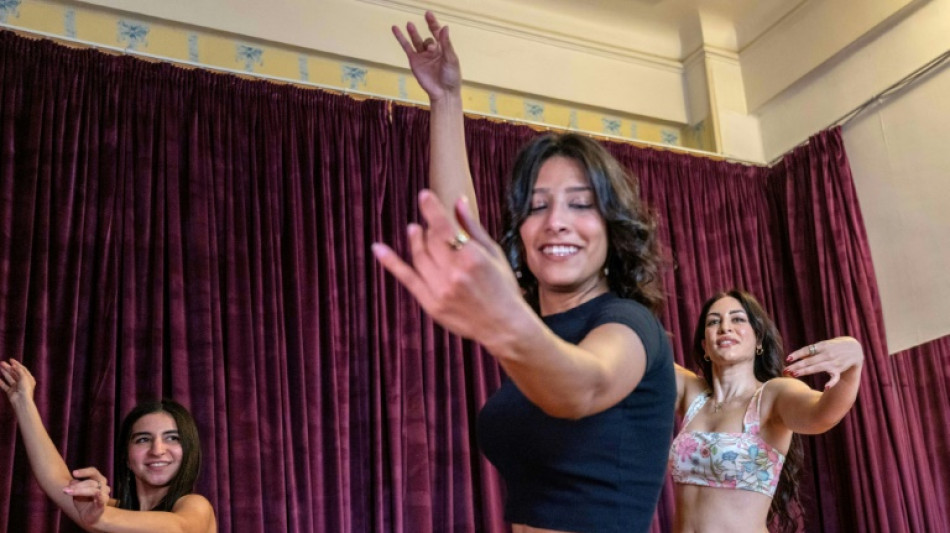
-
 Iran, US prepare for Oman talks after deadly protest crackdown
Iran, US prepare for Oman talks after deadly protest crackdown
-
Winter Olympics opening ceremony nears as virus disrupts ice hockey

-
 Mining giant Rio Tinto abandons Glencore merger bid
Mining giant Rio Tinto abandons Glencore merger bid
-
Davos forum opens probe into CEO Brende's Epstein links

-
 ECB warns of stronger euro impact, holds rates
ECB warns of stronger euro impact, holds rates
-
Famine spreading in Sudan's Darfur, warn UN-backed experts

-
 Lights back on in eastern Cuba after widespread blackout
Lights back on in eastern Cuba after widespread blackout
-
Russia, US agree to resume military contacts at Ukraine talks

-
 Greece aims to cut queues at ancient sites with new portal
Greece aims to cut queues at ancient sites with new portal
-
No time frame to get Palmer in 'perfect' shape - Rosenior

-
 Stocks fall as tech valuation fears stoke volatility
Stocks fall as tech valuation fears stoke volatility
-
US Olympic body backs LA28 leadership amid Wasserman scandal

-
 Gnabry extends Bayern Munich deal until 2028
Gnabry extends Bayern Munich deal until 2028
-
England captain Stokes suffers facial injury after being hit by ball

-
 Italy captain Lamaro amongst trio set for 50th caps against Scotland
Italy captain Lamaro amongst trio set for 50th caps against Scotland
-
Piastri plays down McLaren rivalry with champion Norris

-
 ECB holds interest rates as strong euro causes jitters
ECB holds interest rates as strong euro causes jitters
-
Spain, Portugal face floods and chaos after deadly new storm

-
 EU close to sealing trade deal with Australia
EU close to sealing trade deal with Australia
-
German Cup final to stay in Berlin until 2030

-
 What does Iran want from talks with the US?
What does Iran want from talks with the US?
-
Taming the lion: Olympians take on Bormio's terrifying Stelvio piste

-
 Wind turbine maker Vestas sees record revenue in 2025
Wind turbine maker Vestas sees record revenue in 2025
-
Italy's Casse tops second Olympic downhill training

-
 Anti-doping boss 'uncomfortable' with Valieva's coach at Olympics
Anti-doping boss 'uncomfortable' with Valieva's coach at Olympics
-
Bitcoin under $70,000 for first time since Trump's election

-
 'I am sorry,' embattled UK PM tells Epstein victims
'I am sorry,' embattled UK PM tells Epstein victims
-
England's Brook predicts record 300-plus scores at T20 World Cup

-
 Ukraine, Russia swap prisoners, US says 'work remains' to end war
Ukraine, Russia swap prisoners, US says 'work remains' to end war
-
Wales' Rees-Zammit at full-back for Six Nations return against England

-
 Sad horses and Draco Malfoy: China's unexpected Lunar New Year trends
Sad horses and Draco Malfoy: China's unexpected Lunar New Year trends
-
Hong Kong students dissolve pro-democracy group under 'severe' pressure

-
 Germany claws back 59 mn euros from Amazon over price controls
Germany claws back 59 mn euros from Amazon over price controls
-
Germany claws back 70 mn euros from Amazon over price controls

-
 VW and Stellantis urge help to keep carmaking in Europe
VW and Stellantis urge help to keep carmaking in Europe
-
Stock markets drop amid tech concerns before rate calls

-
 BBVA posts record profit after failed Sabadell takeover
BBVA posts record profit after failed Sabadell takeover
-
UN human rights agency in 'survival mode': chief

-
 Greenpeace slams fossil fuel sponsors for Winter Olympics
Greenpeace slams fossil fuel sponsors for Winter Olympics
-
Greenpeace slams fossel fuel sponsors for Winter Olympics

-
 Kinghorn, Van der Merwe dropped by Scotland for Six Nations opener
Kinghorn, Van der Merwe dropped by Scotland for Six Nations opener
-
Russia says thwarted smuggling of giant meteorite to UK

-
 Salt war heats up in ice-glazed Berlin
Salt war heats up in ice-glazed Berlin
-
Liverpool in 'good place' for years to come, says Slot

-
 Heathrow still Europe's busiest airport, but Istanbul gaining fast
Heathrow still Europe's busiest airport, but Istanbul gaining fast
-
Highest storm alert lifted in Spain, one woman missing

-
 Shell profits climb despite falling oil prices
Shell profits climb despite falling oil prices
-
Pakistan will seek govt nod in potential India T20 finals clash

-
 China shuns calls to enter nuclear talks after US-Russia treaty lapses
China shuns calls to enter nuclear talks after US-Russia treaty lapses
-
German factory orders rise at fastest rate in 2 years in December


'In our blood': Egyptian women reclaim belly dance from stigma
As belly dancing gains popularity internationally, young Egyptian performers are working to restore its reputation at home, pushing back against decades of stigma to reclaim the dance as part of their artistic heritage.
Once iconic figures of Egypt's cinematic golden age, belly dancers have watched their prestige wane, their art increasingly confined to nightclubs and wedding halls.
"No woman can be a belly dancer today and feel she's truly respected," said Safy Akef, an instructor and great-niece of dance legend Naima Akef, a fixture on the silver screen during the 1950s.
Despite her celebrated lineage, Safy, 33, has never performed on stage in Egypt.
"Once the show ends, the audience doesn't respect you, they objectify you," she told AFP.
Today, belly dance is known for skin-baring theatrics performed by foreign dancers and a handful of Egyptians.
The shift has fuelled moral disapproval in the conservative society and pushed even the descendants of iconic starlets away.
"People ask me all the time where they can see belly dancing that does justice to the art," said Safaa Saeed, 32, an instructor at a Cairo dance school.
"I struggle to answer," she told AFP.
Saeed, who was enchanted by Akef as a child, is now part of a movement led by choreographer Amie Sultan to reframe the art as part of Egyptian heritage, fit for theatres, festivals and UNESCO recognition.
- Colonial baggage -
A classically trained ballerina turned belly dancer, Sultan prefers to call what is formally known as oriental dance baladi, from the Arabic word "balad", meaning homeland.
"Baladi reflects the soul of who we are."
"But now it carries images of superficial entertainment, disconnected from its roots," she told AFP.
This disconnection, Sultan said, stems from shifting moral codes -- and colonial baggage.
In her book "Imperialism and the Heshk Beshk", author Shatha Yehia traces the artform's roots to ancient Egypt, but says the modern colloquial term only emerged in the 19th century, coined by French colonisers as danse du ventre, or "dance of the belly".
While descriptive, the phrase exoticised the movement and shaped perceptions both at home and abroad.
"Heshk beshk", an old onomatopoeic Egyptian expression evoking a performer's shaking moves, "is not merely a label for the dancer", Yehia writes.
"It is the Egyptian vernacular version of a femme fatale, the destructive woman who wields her body and feminine power to get what she wants. It's not just a label of vulgarity or immorality, it's synonymous with evil and debauchery."
Yehia argues that views on "heshk beshk" -- now shorthand for provocative, lowbrow dancing -- were shaped both by Western imperialism and local conservatism.
The fallout has been generational.
Akef's great-aunt was a star who "acted, danced and created iconic film tableaux".
But Safy instead has chosen to train others, including in Japan, where she spent three years teaching Egyptian folk and belly dance.
- 'Place of our own' -
Sultan launched the Taqseem Institute, named after the improvisational solos of Arabic music, in 2022.
Since then, dozens of women have been trained at the school, seven of whom now teach full-time.
The students are trained not only in choreography, but also in musicality, history and theory.
They study the evolution of Egyptian dance from pre-cinema figures like Bamba Kashshar and Badia Masabni through the golden age icons like Tahiya Carioca and Samia Gamal.
Sultan even takes the message to universities, giving talks to demystify the art form for new audiences, while her dancers work to preserve its history.
In 2023, she staged El-Naddaha, a performance blending Sufi themes with traditional and contemporary Egyptian movement.
Still, challenges remain.
"We want to have a place of our own -- like the old theatres -- a teatro where we can regularly perform," Saeed said.
Sultan is also pushing for official recognition.
She has begun the process of campaigning for the dance to be inscribed on UNESCO's Intangible Cultural Heritage list.
But the path is long and requires support from the country's culture authorities.
For the time being, the dancers at Taqseem focus on their next performance.
Barefoot and clad in fitted dancewear, they hold one final run-through, undulating to a melody by Egyptian diva Umm Kulthum as the beat of a tabla drum echoes.
It's a dream come true for Saeed, who has been dancing since she was a child.
"I believe it's in our blood," she said with a smile.
G.AbuHamad--SF-PST



